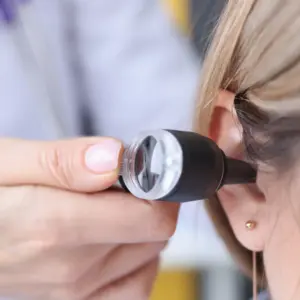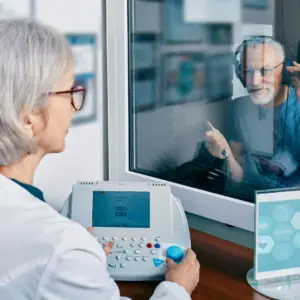Sudden Hearing Loss: Myths vs. Facts
Hearing health is vital, yet sudden changes in our hearing ability can be alarming. Sudden hearing loss is when you experience a rapid decline in hearing, often within a 72-hour window. It might affect one or both ears, ranging from mild to severe. If you notice such changes, seeking immediate medical attention is crucial.
Understanding Sudden Hearing Loss
Sudden hearing loss, also known as sudden sensorineural hearing loss (SSHL), marks an unexpected, rapid decline in hearing sensitivity. This condition can be unilateral, affecting only one ear, which adds to the complexity and urgency of seeking proper diagnosis and treatment. Let’s delve deeper into what this condition entails and why it’s crucial to address it promptly.
Symptoms and Initial Signs
SSHL manifests through several vital symptoms, each indicating a disruption in the normal functioning of the inner ear, which is responsible for processing sounds and maintaining balance. These symptoms include:
- Rapid decrease in hearing ability: This can be so swift that individuals might notice a significant change within hours or over a few days.
- Muffled sounds: Sounds may seem distant or muffled, making it difficult to understand speech and other noises.
- Dizziness or vertigo: The inner ear’s role in balance can lead to feelings of unsteadiness or vertigo, affecting one’s ability to stand or walk confidently.
- Tinnitus: A ringing, buzzing, or hissing sound in the ears; tinnitus accompanies SSHL in many cases, adding to the distress and discomfort.
- A feeling of fullness in the ear: This sensation can mimic the feeling of pressure or fluid buildup, leading some to mistake their condition for something less severe.
The Moment of Discovery
Many individuals with SSHL report noticing their hearing loss under specific circumstances. A common scenario is waking up to find one cannot hear from one ear. Others may only realize the issue when they attempt to use the affected ear, such as during a phone call. Some also report a startling “pop” just before the onset of hearing loss, marking a sudden change in their auditory perception.

Importance of Prompt Action
The inner workings of the ear are delicate and complex, making early intervention critical. SSHL might signal underlying health issues, ranging from viral infections to more severe conditions affecting the inner ear’s sensory organs. Quick action facilitates a better understanding of the cause and opens up treatment options that can reverse or mitigate the hearing loss.
Recognizing the symptoms of sudden hearing loss and understanding the urgency for medical evaluation are paramount. With timely intervention, individuals stand a better chance of regaining some, if not all, of their lost hearing. Awareness and education about SSHL can empower people to act swiftly, reducing the risk of long-term auditory damage.
What Causes Sudden Hearing Loss?
The exact cause of sudden hearing loss often remains a mystery. However, several factors play a role in it:
- Viral and Bacterial Infections: Can damage the inner ear’s hair cells, affecting hearing.
- Meniere’s Disease: Causes fluctuating hearing loss, tinnitus, and vertigo due to abnormal fluid pressure.
- Head Trauma: Impacts inner ear structures, leading to hearing loss.
- Ototoxic Medications: Certain drugs can harm inner ear hair cells.
- Acoustic Trauma: Loud noises can also damage hair cells.
When sudden hearing loss occurs in one ear, specific conditions like Meniere’s disease, middle ear infections, or vestibular schwannoma are often the culprits.
Find out more about ototoxic medications.
Demystifying Myths and Presenting Facts
Sudden hearing loss (SSHL) has misconceptions that can hinder timely treatment and recovery. Let’s clear up some common myths and reinforce the facts to ensure accurate understanding and prompt action.
Myth 1: Sudden Hearing Loss Will Always Resolve on Its Own
Fact: While it’s true that some individuals may experience spontaneous recovery, this is not a guarantee. Immediate medical intervention significantly enhances the chances of regaining hearing. Steroid treatments, for example, are most effective when started early. Relying on the hope of natural recovery can lead to permanent hearing loss.
Myth 2: Only the Elderly Experience Sudden Hearing Loss
Fact: SSHL does not discriminate by age. It can affect individuals of all ages, including children and young adults. Although it’s more commonly reported in people in their late 40s and early 50s, anyone experiencing sudden hearing changes should seek medical advice.
Myth 3: It’s Just Earwax or a Minor Infection
Fact: While earwax buildup and infections can cause hearing loss, the suddenness and severity of SSHL symptoms usually indicate a more serious condition. Dismissing these signs as something minor can delay crucial treatment and potentially lead to worse outcomes.
Myth 4: Hearing Aids Won’t Help with Sudden Hearing Loss
Fact: If SSHL results in permanent hearing loss, hearing aids can be a viable solution for many. Modern hearing aids are highly sophisticated devices capable of significantly improving hearing and quality of life. Consulting with an audiologist can determine the best course of action.
Myth 5: Sudden Hearing Loss Only Affects Hearing
Fact: Beyond the auditory impact, SSHL can also affect balance and lead to tinnitus, adding to the overall distress. These associated symptoms highlight the importance of addressing SSHL as a comprehensive health concern, not just a hearing issue.
Myth 6: If You Don’t Experience Pain, It’s Not Serious
Fact: SSHL often occurs without any physical pain, which can misleadingly suggest that it’s not severe. The absence of pain does not diminish the urgency for evaluation and treatment. Hearing health is a critical aspect of overall well-being and should be treated with prompt attention.
Fact-Checking for Better Outcomes
Understanding the realities of sudden hearing loss is essential for timely and effective treatment. Dispelling myths and focusing on the facts encourages individuals to seek medical attention swiftly, enhancing the prospects for recovery. Awareness and education are key to shifting perceptions and promoting a proactive approach to hearing health. If you or someone you know experiences sudden changes in hearing, remember these facts and act quickly to consult healthcare professionals.

Taking Action Against Sudden Hearing Loss
If you suspect sudden hearing loss, act quickly:
- Seek Immediate Medical Attention: Time is critical for effective treatment.
- Consult an ENT Specialist or Audiologist: They’ll conduct tests to diagnose and recommend treatment.
- Understand the Treatment Options: These may include steroids, hyperbaric oxygen therapy, or hearing aids, depending on the cause.
Lowering Your Risks
Protecting your hearing involves:
- Using ear protection in noisy environments.
- Limiting headphone volume and exposure.
- Treating ear infections promptly and managing chronic health conditions.
- Regular hearing checkups for early detection and management.
Discover more about how to protect your hearing.
Check Your Hearing Today for a Better Tomorrow
Sudden hearing loss is a pressing health concern that demands immediate action. Recognizing the symptoms and understanding the causes are the first steps toward protecting your hearing health. Contact Stanford Hearing for a preventative hearing evaluation. Taking proactive steps today can safeguard your hearing for the future.
